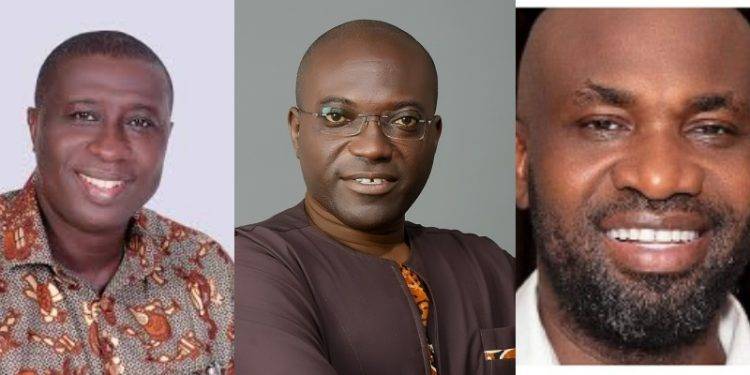Ghana’s political landscape continues to heat up as the National Democratic Congress (NDC) raises significant legal objections to the swearing-in of three New Patriotic Party (NPP) Members of Parliament-elect. The constituencies at the center of this latest controversy are Okaikwei Central, Tema Central, and Techiman South, where Patrick Yaw Boamah, Charles Forson, and Martin Adjei Mensah Korsah, respectively, were declared winners following a High Court-ordered collation of results.
Justice Srem Sai, a prominent member of the NDC's legal team, has voiced concerns over the process, describing it as fraught with legal and procedural irregularities. He argues that proceeding with the swearing-in of these MPs would be a violation of constitutional principles and has called for immediate action to halt the process.
Disputed Collation Process Sparks Controversy
The controversy stems from the High Court’s directive for the Electoral Commission (EC) to conduct a re-collation of results in the three constituencies. This process led to the declaration of the NPP candidates as winners. However, the NDC contends that the re-collation was carried out amidst unresolved legal challenges, rendering the outcome invalid.
Speaking on the Citi Breakfast Show on January 6, Justice Srem Sai accused the EC of acting unlawfully by proceeding with the re-collation despite being served with an appeal for a stay of execution.
“I do not see why someone will say the swearing-in will happen, and I don’t think we should continue to entertain that because it is unlawful. We appealed for a stay, and that has been served on the Electoral Commission,†he said.
Srem Sai further revealed that the EC had filed an affidavit opposing the NDC’s appeal, which places the entire process under judicial review. “Our point is that once you have a notice of a stay application, you cannot in any lawfulness conduct the re-collation. If you continue to do that, you breach the orders that the court has made,†he added.
Calls to Halt Swearing-In
The NDC’s legal team argues that allowing the swearing-in of the three MPs would amount to endorsing a flawed process. Srem Sai stated that the validity of the results must be resolved before any formalities can take place.
“We are saying that the three MPs ought not to be sworn in. They should not be sworn in until such a time that the markings concerning their alleged election are resolved,†he emphasized.
The NDC has consistently challenged the results of these constituencies, raising questions about the credibility of the collation process and the subsequent declarations. The party insists that any procedural missteps must be rectified to uphold the integrity of Ghana’s democratic process.
Electoral Commission Under Scrutiny
The Electoral Commission has found itself in the spotlight, facing criticism from the NDC for its handling of the re-collation process. According to the NDC, the EC acted in defiance of established legal procedures by proceeding with the collation despite being served with a stay of execution.
The NDC’s objections underscore the need for transparency and adherence to legal frameworks in electoral processes. Critics argue that the EC’s actions have further deepened political tensions in the country, undermining public trust in the institution.
Political Implications
The ongoing dispute has significant political implications, as the swearing-in of MPs plays a crucial role in the composition of Parliament. With the NPP and NDC closely matched in parliamentary seats, the inclusion or exclusion of these three MPs could impact the balance of power in the legislative body.
Observers have noted that the controversy reflects the high stakes of Ghana’s political arena, where every seat matters. The outcome of this dispute could shape the dynamics of the next Parliament, influencing legislative priorities and the ability of either party to advance its agenda.
Civil Society and Public Reaction
The NDC’s objections have sparked mixed reactions from the public and civil society groups. While some have called for a swift resolution to the dispute to avoid further delays in parliamentary activities, others have emphasized the importance of ensuring that due process is followed.
Civil society organizations have urged both parties to prioritize the rule of law and engage in constructive dialogue to address the issues at hand. They argue that resolving the dispute through legal channels is essential to preserving the integrity of Ghana’s democratic institutions.
Path Forward
As the January 7 swearing-in date approaches, all eyes are on the courts to determine the way forward. The NDC has vowed to pursue all legal avenues to challenge the declarations and prevent the swearing-in of the three MPs.
The EC, on the other hand, maintains that it acted in compliance with the High Court’s directive, setting the stage for a legal showdown.
The unfolding drama highlights the complexities of Ghana’s electoral process and the need for robust mechanisms to address disputes. It also underscores the importance of transparency and accountability in safeguarding the country’s democratic values.
For now, the fate of the three MPs hangs in the balance, with the courts expected to play a pivotal role in resolving the controversy. As the nation awaits the outcome, the dispute serves as a reminder of the critical importance of upholding the rule of law and ensuring the credibility of electoral processes in fostering democratic stability.




No comments yet
Be the first to share your thoughts!